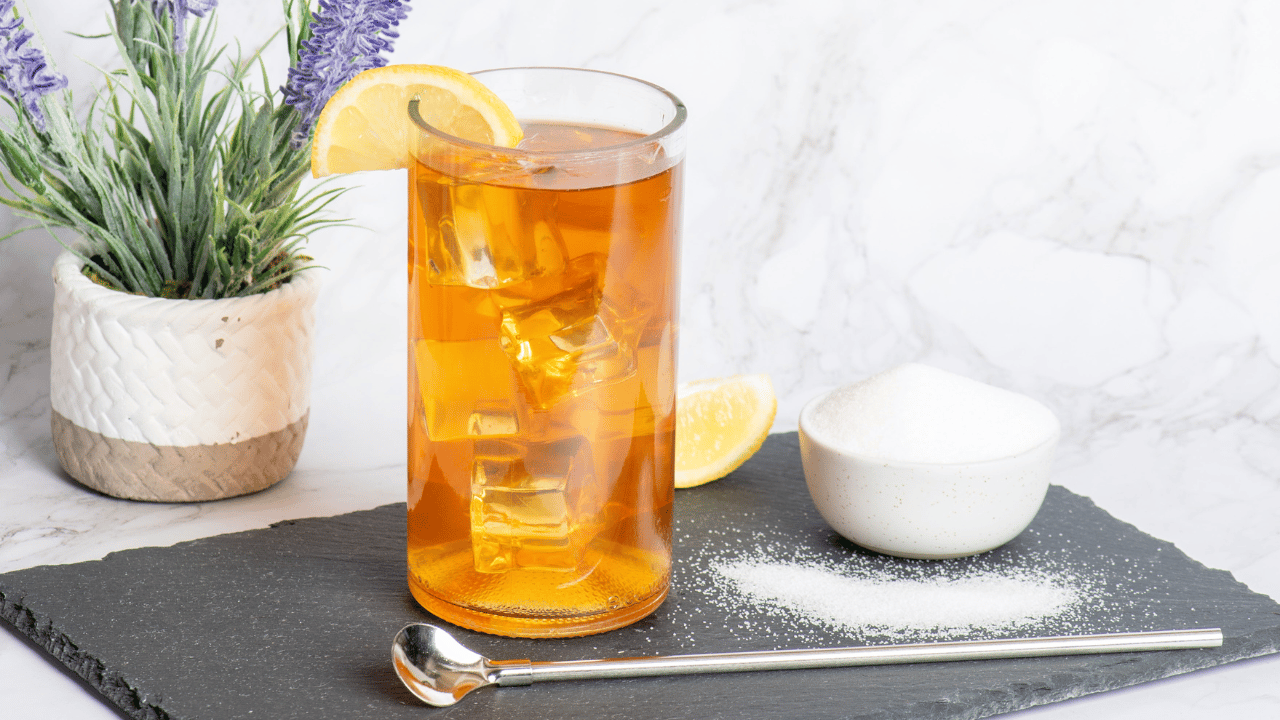Last Updated on December 13, 2022 by Kayla
Last week I had the pleasure of presenting about artificial sweeteners. This conversation got me thinking about all the crazy things we do to both obtain and abstain from sugar. 🍰
Perhaps you avoid the break room at work because Becky keeps bringing in those gosh darn donuts holes you can’t resist. Contrary to this, maybe you go out of your way to get that dopamine hit from this tempting white crystal.

Whichever it is, I hope to provide you with my thoughts about sugar and sugar substitutes, so you can make an educated decision on what suits your lifestyle best!
Skeletons in the closet 🦴
Some artificial sweeteners have quite a tainted history – or do they?
You’ve likely heard how artificial sweeteners cause cancer, induce cravings, or pile on the pounds – all of which may carry some truth.
Saccharin was the first artificial sweetener to hit our food supply in the late 1800s. Before the 1950s, artificial sweeteners were favored over table sugar due to cost. Imagine that, food manufacturers looking to save a dime. 💰
Later on, studies revealed that saccharin caused bladder cancer in laboratory rats; however, one thing that isn’t well known is the amount of artificial sweeteners used in many of these studies.
Most artificial sweeteners are 20-20k times sweeter than table sugar. Twenty-thousand times! 🤯
This means that a very tiny amount of artificial sweetener is needed to provide the same sweetness as sucrose, or table sugar.
In many research studies, however, rats are fed crazy amounts of artificial sweeteners which don’t necessarily correlate to what a human would actually consume.
This doesn’t mean that artificial sweeteners come with zero risk though. I’m just saying. The research could use some improvement, and it’s especially important to check out who funds food studies!
Zero Calories ≠ Zero Impact
One of the key messages I drove home last week during my presentation is that just because a food or drink has zero calories doesn’t mean it has zero impact.
For example, zero-calorie sweeteners can still activate digestion and stimulate the release of insulin, your “storage” hormone.
Insulin’s job is to help sugar from your blood get into your body’s cells – a good thing. But what happens when you drink something sweet with no calories – like a Diet Coke? Hey, all you Diet Coke addicts out there! 👋

Well, your body might respond by thinking, “Hey! We’ve got sugar on the way!” and proactively release insulin.
This can cause a drop in blood sugar followed by cravings (for high-sugar, high-carb foods) to compensate for the calories and carbs your body thought it would get, but never actually received.
Besides this cat-and-mouse game of managing your blood sugars, artificial sweeteners can also impact gut health. Aspartame and sucralose are two primary offenders – that we know of.
Every day we continue to learn more about the relationship between alternative sweeteners, gut health, and obesity. And, it’s important to note that Americans are eating less sugar (and more artificial sweeteners), yet obesity rates continue to climb.
Current national nutrition guidelines suggest a limit of 50 grams of added sugars per day. The equivalent of a 1/4 cup of sugar! Still too much, in my opinion.
Sugar vs Sweeteners: What’s better?
All in all, artificial sweeteners are the lesser of two evils.
First of all, with artificial sweeteners, a little bit goes a long way. Perhaps you’ve experienced this by putting one too many drops of stevia in your coffee?
Another reason is that sugar causes many chronic health issues, including inflammation, diabetes, heart disease, neurological disorders, and more.
Based on the current research, I’ve narrowed down my top picks for sweeteners. You can find them below with links to some of my pantry staples.
STEVIA
Stevia is 250-300x sweeter than sugar. It contains zero calories and comes in a powder or liquid. I like using NOW organic liquid stevia^ to sweeten coffee drinks and overnight oats. A few drops go a long way!
MONK FRUIT
Like stevia, monk fruit is a more natural zero-calorie sweetener. Personally, I haven’t had much experience with this one, but you can purchase it in powder or liquid forms. Manufacturers occasionally sneak in other sweeteners or fillers like dextrose, so read the ingredients label!

ERYTHRITOL
Baking season is just around the corner, and I love using erythritol to substitute both granulated and brown sugar in baked goods. My go-to’s for baking are the Swerve sugar substitutes^.
Pronounced ur·i·thruh·taal, this sweetener is a sugar alcohol and can cause gas & bloating if consumed in large quantities.
Words from the Wise
“Eating is a need, enjoying is an art.”
-Francois de La Rochefoucauld (1613-1980)
One key indicator of my clients’ success and ability to lose and maintain weight is that they still enjoy their favorite foods.
Your latest vow to lose weight doesn’t have to include purging the cupboards of your favorite foods, and unfortunately, this all-or-nothing thinking is what likely got you to where you are in the first place.
If you are a woman who had weight loss surgery and is struggling to see results, my Back On Track program is launching soon and includes an emphasis on emotional eating. You’ll identify your eating triggers and examine new healthy coping mechanisms and strategies to simplify nutrition after bariatric surgery.
Learn more about the LIFe Back On Track program or to explore other ways to work with me!
Yours truly,
Helping women after bariatric surgery lose weight without eating “perfect.” Learn how to balance blood sugar & optimize your “tool” today! Apply to learn more!
This post may contain affiliate links. When you make a purchase through any of the links, there is no additional cost to you, and I may earn a small (and very appreciated) commission. Thank you for your support!


